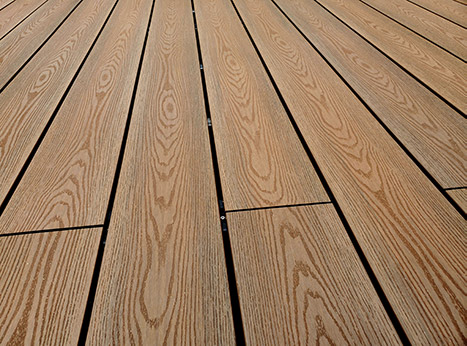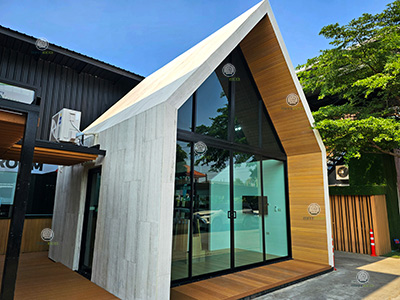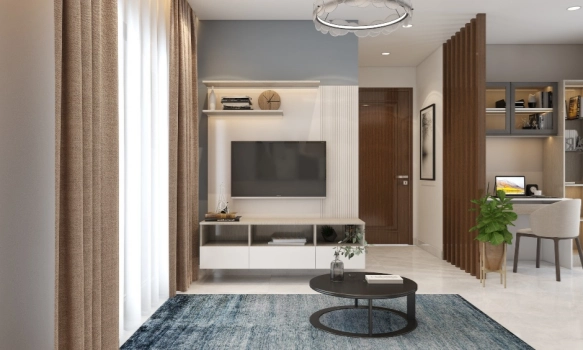What is better composite siding or vinyl siding?
Composite siding and vinyl siding are both popular choices for exterior coverings, with similarities and distinctions worth noting. When considering which material is superior, both offer comparable pricing, cost-effectiveness, visual appeal, and ease of maintenance, featuring excellent properties. However, composite wall panels outshine vinyl counterparts in terms of weather resistance, durability, environmental sustainability, insulation capabilities, and cost-effective installation.
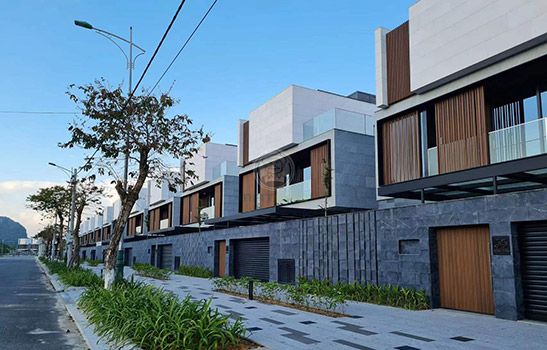
Composite Wall Siding for Apartment
What is composite siding?
Composite siding also called WPC panels, composite wood siding is a versatile building material blending the aesthetics of natural wood with the durability of synthetic components. Typically composed of wood fibers and recycled plastics, it convincingly replicates wood's appearance without its vulnerabilities to rot and pests. This means you get the timeless look of wood without the constant upkeep. It's highly resistant to moisture and decay, making it a robust choice for various climates. Maintenance is minimal, requiring only occasional cleaning. Additionally, its use of recycled materials and longevity make it an eco-friendly option. In essence, composite siding offers a durable, attractive solution for homeowners seeking the charm of wood without the hassles.
What is vinyl siding?
Vinyl siding is a widely used and enduring siding option for homes, known for its versatility and affordability. Composed primarily of polyvinyl chloride (PVC), a durable plastic material, vinyl siding is manufactured in various profiles and colors, making it adaptable to a range of architectural styles. Vinyl siding offers homeowners a budget-friendly, resilient, and visually flexible option for enhancing the exterior of their homes, making it a compelling contender in the siding market.
Durability Battle: Composite Siding vs. Vinyl Siding
When it comes to siding materials, durability is a paramount concern for homeowners, and understandably so. After all, your choice of siding will be the first line of defense against the elements. Here, we'll explore how composite siding, particularly advantageous from our perspective as sellers, stands up to the durability challenge compared to vinyl siding.
Composite Siding's Resilience:
Composite siding shines when it comes to durability. Its composition, which melds wood fibers or byproducts with synthetic materials, results in a material that's incredibly resistant to common sources of deterioration. Moisture, a perennial enemy of exterior materials, poses minimal threat to composite siding. This resistance to moisture means it won't warp, crack, or rot, even in wet climates or areas with high humidity. For regions prone to insect infestations, composite siding is a fortress; it repels termites and other pests that can wreak havoc on traditional wood siding. Furthermore, MATECO exterior wall cladding WPC coating is UV-resistant, we have a 10-year guarantee that it will not fade. Homeowners can rest easy knowing that their composite siding will stand strong against whatever nature throws its way, offering peace of mind for years to come.
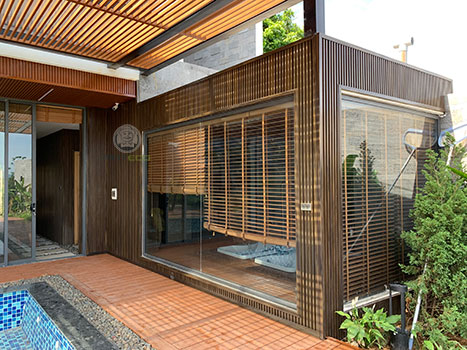
WPC Outdoor Wall Panels for Patio
Vinyl Siding's Durability:
While vinyl siding also boasts durability, particularly against moisture and pests, it's essential to consider how it stacks up in comparison. Vinyl siding is highly resistant to moisture, which is beneficial for maintaining its appearance and structural integrity over time. It's also impervious to termites and doesn't support fungal growth, reducing the risk of damage commonly associated with wood siding. However, it's worth noting that vinyl siding may not be as resilient as composite siding in certain scenarios. For instance, in extreme weather conditions or instances of impact, vinyl siding can become brittle and may crack or break, potentially requiring replacement. Additionally, while it's low-maintenance, its longevity may be affected by exposure to UV rays, which can cause fading or discoloration over time. Therefore, for homeowners seeking the highest level of durability, composite cladding can be the more robust choice.
Making the Durability Choice:
Ultimately, the choice between composite siding and vinyl siding when it comes to durability depends on your specific needs and priorities. Both materials offer advantages, but for homeowners seeking maximum resilience and longevity, composite siding, with its resistance to moisture, pests, and temperature extremes, is the robust option that can provide enduring protection and aesthetics for their homes.
Maintenance Requirements: Composite Siding vs. Vinyl Siding
Maintenance is a significant consideration when selecting siding for your home. The amount of time and effort you'll need to invest in upkeep can greatly influence your decision. Here, we'll examine the maintenance requirements of both composite cladding and vinyl siding, underscoring the benefits of choosing composite siding.
Composite Siding's Minimal Upkeep:
One of the standout advantages of composite siding is its minimal maintenance requirements. Unlike traditional wood siding that demands periodic staining or painting to preserve its appearance and integrity, composite siding is incredibly low-maintenance. It's naturally resistant to moisture, which means you won't need to worry about water-induced warping, cracking, or rot. Furthermore, it's impervious to termite infestations and fungal growth, eliminating the need for pest control treatments. Cleaning is typically a straightforward task, involving occasional washing with water and mild detergent to remove dirt and grime. There's no need for time-consuming and costly repainting or staining, saving you both time and money over the long term. Composite cladding allows you to enjoy the aesthetic appeal of wood without the constant upkeep, making it an attractive choice for homeowners seeking a hassle-free solution.
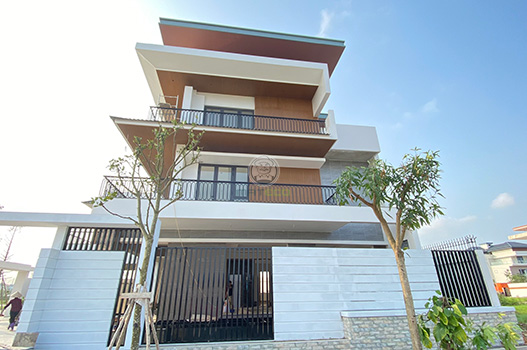
WPC Wall Panels for Home
Vinyl Siding's Low Maintenance Profile:
Vinyl siding is also renowned for its low-maintenance characteristics. Much like composite siding, it's resistant to moisture, reducing the risk of rot or mold. It doesn't require painting or staining, and cleaning is typically a simple process involving a hose and mild soap. However, it's important to note that vinyl siding may require a bit more attention than composite siding in terms of maintenance. While it doesn't demand repainting, it can be susceptible to fading or discoloration due to exposure to UV rays over time. Additionally, in regions with extreme weather conditions or if impacted by significant force, vinyl siding can become brittle and may crack, potentially necessitating replacement.
Choosing Ease of Maintenance:
In the battle of maintenance requirements, composite siding emerges as the champion for those who value minimal upkeep and long-term cost savings. Its innate resistance to moisture, insects, and the absence of the need for painting or staining makes it an ideal choice for homeowners seeking the beauty of wood without the associated maintenance headaches. While vinyl siding offers low maintenance as well, it's important to consider its susceptibility to UV-related fading and potential brittleness in harsh conditions.
Cost Comparison: Composite Siding vs. Vinyl Siding
Cost is often a pivotal factor when deciding on siding materials for your home. Here, we'll compare the costs associated with both composite siding and vinyl siding, offering insights into the financial aspects of these choices.
Composite Siding Costs:
Composite siding is known for its durability and aesthetic appeal, but how does it fare in terms of costs? The initial investment for composite wall panels may be slightly higher than that of vinyl siding. This is primarily because composite wall panels are a premium material that offers the visual charm of wood without the maintenance demands. However, it's essential to consider the long-term perspective. Composite siding's durability and resistance to decay and pests mean you won't need to invest in costly maintenance or replacements down the line. Over the years, this can lead to substantial savings in terms of both time and money. Additionally, the availability of various styles and finishes allows you to tailor your investment to your aesthetic preferences, ensuring your home's exterior looks exactly as you envision.
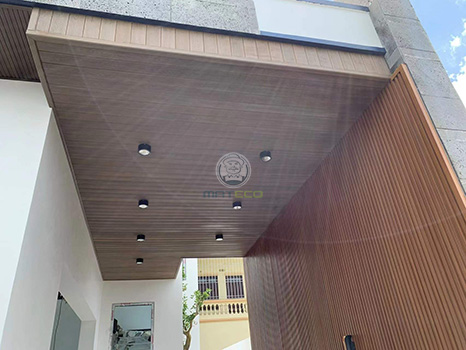
WPC Wall Panels for Home
Vinyl Siding Costs:
Vinyl siding, on the other hand, is often considered a more budget-friendly siding option in terms of initial installation costs. Its affordability is one of its key selling points. However, it's crucial to evaluate the long-term expenses associated with vinyl siding. While it may be less expensive initially, it may require more frequent maintenance, such as cleaning, and could potentially need replacement in the event of damage. Additionally, homeowners should be aware of the potential for fading due to UV exposure, which may necessitate future investments in repairs or replacements. When weighing the cost of vinyl siding, it's important to consider the total cost of ownership over the years, factoring in maintenance and potential replacement expenses.
Choosing the Right Investment:
The choice between composite wall panels and vinyl siding regarding cost ultimately depends on your budget and long-term perspective. Composite siding may have a slightly higher upfront cost, but its exceptional durability and low maintenance can lead to cost savings over time. It's a wise investment for homeowners who appreciate the value of a long-lasting, hassle-free siding solution. Vinyl siding, while more budget-friendly initially, may incur additional expenses in maintenance and potential repairs or replacements. It's an option for those seeking an economical choice, but it's important to consider the total cost of ownership when making your decision.
Conclusion
When it comes to deciding between composite cladding and vinyl siding, it ultimately boils down to aligning the cladding material with your specific needs, preferences, and priorities. If you value the classic charm of wood, along with the durability, minimal maintenance, and long-term cost savings, then composite cladding stands as the ideal choice. Its ability to mimic the aesthetic appeal of wood without vulnerabilities makes it a compelling option for homeowners who want to enjoy the timeless beauty of wood without the upkeep. On the other hand, if budget constraints are a primary concern and you can accommodate the potential for more maintenance and shorter-term costs, vinyl siding offers affordability and versatility. However, it's essential to weigh the long-term costs and consider the maintenance requirements over time. Whether you opt for the longevity and elegance of composite cladding or the affordability and adaptability of vinyl siding, the right choice is the one that aligns with your unique vision and priorities for your home's exterior.
If you are looking for a WPC manufacturer, MATECO WPC will be your best choice.
Website: https://www.matecowpc.com
WhatsApp: +86-13380085620
Email: info@matecowpc.com




